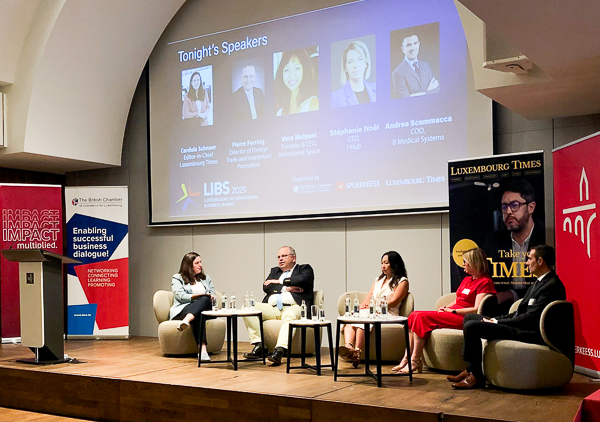 Panel discussion at the 4th edition of the Luxembourg International Business Summit;
Credit: Ievgenii Karanov, Chronicle.lu
Panel discussion at the 4th edition of the Luxembourg International Business Summit;
Credit: Ievgenii Karanov, Chronicle.lu
On Tuesday 3 June 2025, the British Chamber of Commerce for Luxembourg (BCC) hosted the fourth edition of the Luxembourg International Business Summit (LIBS) under the theme "Putting Luxembourg on the Global Business Map" at Spuerkeess in Luxembourg city centre.
This year's summit attracted around 150 participants and addressed the challenges Luxembourg faces in reinforcing its role on the global business map. As the international landscape continues to evolve, with issues ranging from trade tensions to emerging markets, the speakers discussed how Luxembourg can compete with larger economies, promote its presence through trade offices and business missions, and unlock global growth potential. The summit also made reference to the ongoing Osaka World Expo.
Vera Mulyani, Founder and CEO of Astrobiome Space, shared her experience at the Expo, noting the impact of such initiatives for startups: "Very unexpectedly, I was surprised how much I learned about Luxembourg through this experience in Japan." She praised the diversity and unity of the Luxembourg delegation, which helped her understand the country's direction in innovation and entrepreneurship.
Stéphanie Noël, CEO of i-Hub, spoke on the role of economic missions in expanding into unfamiliar markets such as the Middle East and Africa. She highlighted that such initiatives offer critical first contacts and cultural insights, especially in markets with vastly different regulatory environments. Drawing on her own experiences in Abu Dhabi and Iran, she underlined the need for adaptability: "Cultural changes or adaptation and regulations - that's the minimum when you want to expand to these countries."
Andrea Scammacca, COO of B Medical Systems, echoed the value of bilateral cooperation, noting that government support was key to accelerating the company's international expansion. He cited successful missions in Niger and Congo, as well as enhanced visibility through international exhibitions: "Thanks to the collaboration and the promotion that Luxembourg has done for B Medical, we now have manufacturing in Luxembourg and distribution in more than 200 countries." He also pointed to regulatory adaptation as a success factor in markets such as Indonesia, where local sourcing requirements were met through hybrid production models.
During the discussion, Pierre Ferring, Director of Foreign Trade and Investment Promotion at Luxembourg's Ministry of Foreign Affairs, emphasised the strategic importance of strengthening Luxembourg's global trade office network. He noted "trade promotion is about people, culture and long-term commitment", adding that opening new offices alone is not sufficient without deeper financial and staffing resources. He pointed to opportunities in Southeast Asia, the UK and parts of Africa - particularly in the emerging tech sector - while underlining that trade offices cannot replace the need for strong products and sustained private-sector engagement.
Andrea Scammacca reflected on the company's underestimated challenges in entering the US market. He noted "American clients expect a strong local presence, including a manufacturing base and rapid after-sales service," which small foreign firms often struggle to provide. Stéphanie Noël shared lessons from operating in Africa and the Middle East, warning of complex regulatory and financial environments. She highlighted "signing a contract does not guarantee payment" and stressed the importance of local partnerships, patience and financial resilience when navigating these markets.
Pierre Ferring also discussed the need for long-term engagement over trend-following, pointing to the importance of continuity in trade promotion. "The next big thing is always difficult to predict - if we all knew it, we'd already be there," he said, adding that government missions should balance attracting foreign investment with supporting Luxembourg companies abroad.
Closing the discussion, panellists reflected on innovation and sustainability. Andrea Scammacca shared how national research programmes enabled B Medical Systems to develop a solar-powered "Health Centre Kit" for use in areas without regular electricity. He also welcomed R&D support in artificial intelligence, calling it key to staying competitive.
Stéphanie Noël underlined the value of building global businesses from Luxembourg by combining local R&D with international expertise, particularly in IT. "You bring the expertise here and resell it with the advantage of having this investment base," she said, adding that diplomatic networks play a vital role in market entry.
Vera Mulyani concluded by calling for more cross-sectoral collaboration, noting that her startup's work often sits between health, agriculture and space: "The real value is in the middle, where they intersect."
The event concluded with informal networking on the rooftop terrace of Spuerkeess.








